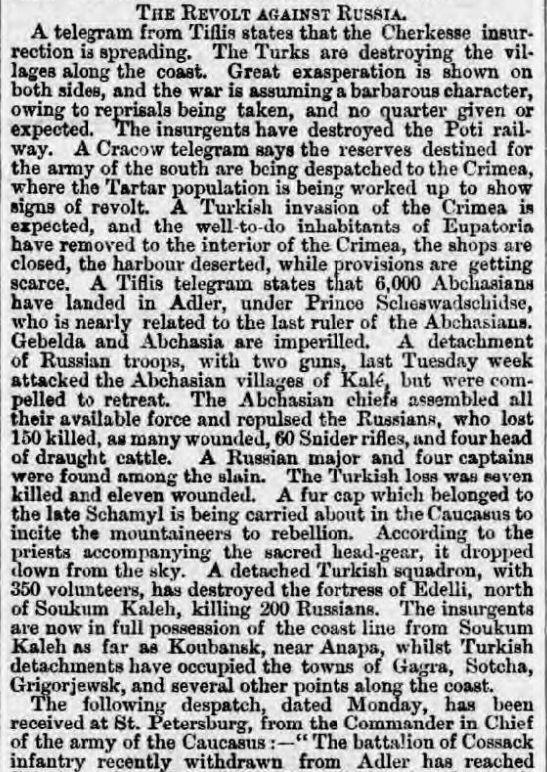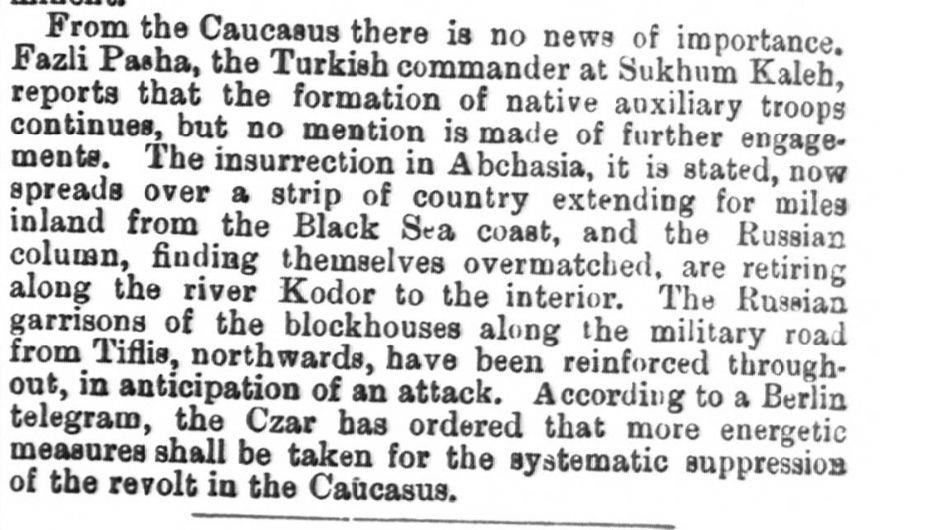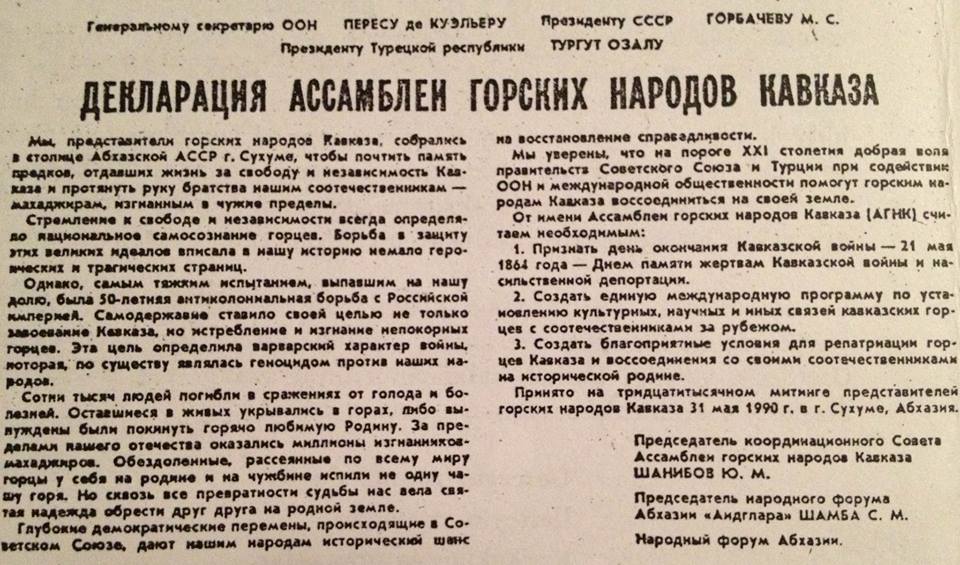Writing and Rewriting History: A Response to Ruslan Kesh by Metin Sonmez
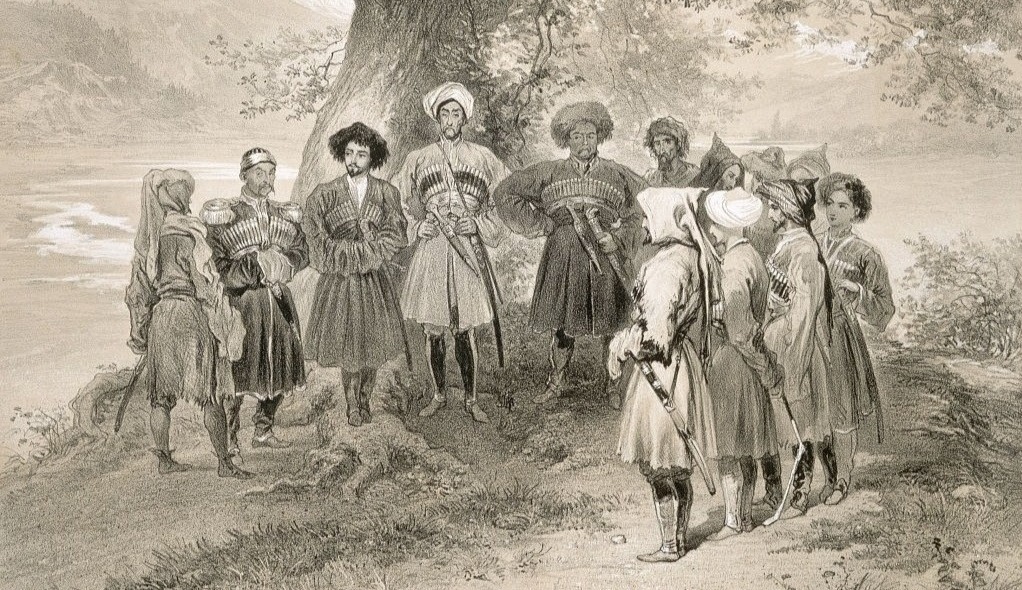
The Ubykh and Abkhazian leaders in the Sochi valley 1841
Ruslan Kesh states that it is false of Abkhazian historians to try to link their ancestors' deportation to the Ottoman Empire, which he dates to the period of the Russo-Turkish War (1877), with the genocide of the Circassians during the Caucasian War, which he states began in 1763 and ended in 1864 with massive deportations to Ottoman lands. Like a number of Circassian writers, Kesh seeks not merely to downplay but actually to deny Abkhazian involvement in the Great Caucasian War, the start of which is more commonly dated to 1816. Which of these positions is the 'false' one?
As a Circassian, I invite interested readers to make up their own minds by considering the following observations, beginning with that of James Stanislaus Bell, an English commentator (and activist) actually 'in situ' on the east coast of the Black Sea during the years 1837, 1838, and 1839:
J.S. Bell 'Journal of a Residence in Circassia during the Years 1837, 1838, and 1839' (volume 2, pp.328-9):
"The Azras [= Abkhazians] behind Sukhum-kaleh continue to carry on war with the Russians on that coast, and with those of their countrymen who have made peace with them. They have just made a great and successful foray upon the cattle of the latter; and a still more disastrous one, in which a large village near the noast was surprised by night, and aout seventy of its women and children borne off, was made last winter by the people on this side of Gaghra. This exploit serves as a good exemplification of the extreme hardihood and power of endurance of the mountaineers of this neighbourhood, whom an elderly russian soldier of much experience in warfare and its hadships through many climes and countries, declares he never knew at all equalled in these respects by any people whatever..”
Excerpts from: "Through The Caucasus To The Volga (1931)" by Fridtjof Nansen:
"…When Shamyl had been taken prisoner there was none left who could gather the Lesghis and Chechens to fight the Russians, and the whole of Daghestan and Chechnia made its submission* The Russian forces were thereby set free on this front, and could now be concentrated against the north-western Caucasus, where the Abkhasians and the Circassian or Cherkess tribes (the Adigheb) were still defending themselves with the utmost heroism." (p.171)
"…Then came the Crimean War in 1853, and It have been thought that the time had come for the Abkhazians and Circassian with the support of the Turks and the Western Allied Powers, utterly to destroy the Russians In their own part of the Caucasus." (p.173)
“…The Pole, Lapinski (Tefik Bey), in his Die Bergwlker des Kaukasus und ihr Freiheitskampf gegen die Russen, 1863, gives an interesting description of the fighting by the Circassians and Abkhasians, and of Ms share in it."
Excerpt from Stanislav Lakoba's “History: 18th Century-1917” "The Abkhazians: a Handbook":
“...In June 1861, on the initiative of the Ubykhs, a 'mezhlis' (parliament) was constituted not far from Sochi; it was known as 'The Great and Free Assembly'. The Ubykhs, the Circassian Shapsughs and Abadzekhs/Abzakhs, and the Abkhazian tribes of Ahchypsy, Ajbga as well as the coastal Sadzians strove to unite the mountain tribes into 'one huge barrage'. A special deputation from the mezhlis, headed by Izmail Barakaj-Ipa Dzapsh, visited a range of European states.”
Update (May 23, 2020) Lapinski: Abkhaz people are the last in the Caucasus who still put up resistance to the Muscovites
“...Active participation in the liberation struggle in the West Caucasus was taken by Polish revolutionaries who intended to raise simultaneously an Abkhaz-Circassian and Polish revolt against the Russian empire. Obsessed with this idea was Col. Teofil Lapinskij (1827-1886). At the end of 1862 he visited London at the head of an Abkhaz-Adyghean deputation. The deputation was received by the Prime Minister of England, Lord Palmerston. Lapinskij delivered this short speech in his presence: 'At the present moment the Abkhazians are the sole tribe who are continuing to mount powerful resistance to Russia in the Caucasus. But even they have become exhausted under the weight of the unequal battle and can be expected to hold out in such conditions for at most another three years.”
See “Circassia: Speech of Stewart E. Rolland - 1862:” Two names appears "Hadl Hayder Hassan" and "Kustan Ogli Ismael" (Ismaeil, Son of Kustan)]
“About two years ago, desiring to enter into the family of constituted nations, the Circassians and Abasians elected a kind of Parliament, which is now ruling our joint nation, numbering about a million souls.”
For the "Abasia(n)" term see: https://abkhazworld.com/aw/publications/archives/969-circassia-the-vixen-freemans-journal-friday-24-march-1837
Excerpt from “Littell's Living Age: The Circassian Exodus” 1864:
“In the presence of these difficulties they implore the protection of the queen, and pray her to interfere to prevent the extermination of a nation numbering a million of souls: these are the Circassians and Abkhasians.” (p.466)
Excerpt from “Teofil Lapinski: Hero and Leader of the Circassian War for Independence (Part One)” by Ali Berzegov:
“The citizens of Cherkessia in the 19th century included the entire population of western Cherkessia, its eastern part—Kabarda, and Abkhazia. As a matter of fact, the people’s representatives from Abkhazia participated in all proceedings of the national parliament during the existence of Cherkessia.
Excerpt from “Circassian Resistance to Russia”, by Paul Henze “The North Caucasus Barrier”
“...Wagner reported an expedition of 600 Russian regulars accompanied by 2,000 Georgian auxiliaries against the Ubykhs in October 1841.”
“...This was the last of the energetic forays that had begun with General Veliaminov’s 12,000-man expedition against the Abkhaz and Circassians in 1835. First threatening scorched-earth tactics and resorting to deliberate brutalities.”
“...Neither Shamil’s murids nor the Circassians and Abkhaz laid down their arms.”
Excerpt from "The Conquest and Deportation of the Circassians", by John Colarusso
"At a meeting in October 1860, Prince Bariatinksy and General Fadeev called for “the unconditional expulsion of the Circassians from their mountain refuges.” General Yevdokimov wanted to “compel them either to resettle in the open lowlands or leave for Turkey.” The tribes that had already submitted were to be deported as well as those still resisting, such as the Shapsegh, Natukhay, Ubykh, Abaza, and Abkhaz."
Excerpt from “Papers respecting the Settlement of Circassian Emigrants in Turkey” (Presented to the House of Commons by Command of Her Majesty, in pursuance of their Address dated June 6, 1864'.)
Consul Dickson to Earl Russell. – (Received May 17)
Soukoum-Kalé, April 13, 1864.
“The Ubikh and Fighett tribes are fast embarking for Trebizond. In fact, after their land having been laid waste by fire and sword, emigration to Turkey is the only alternative allowed to those mountaineers who refuse to transfer themselves to the Kouban steppes and contribute periodically to the militia.”
I should note that the 'Fighett' is clearly a slip for 'Dzhiget', and it is known from contemporary sources that the Dzhigets called themselves /a.sadz.kWa/, which is clearly an Abkhazian (not Circassian) word -- the Sadz tribe were thus a tribe of Abkhazians (not Circassians).
Excerpt from the "Journal de St. Pétersbourg" of May 19, 1864
Bulletin du Caucase
“Ensuite, les anciens des Oubykhs, des Schapsougs, des Djighètes, et des Akhtchipskhouves se rassemblèrent, vers le 30 Mars, auprès du détachement, pour être présentés à Son Altesse Impériale le Commandant-en-chef de l'armée du Caucase et lui faire leur soumission.'
“Then, the elders of the Ubykhs, Shapsughs, Dzhigets and Akhchypsous assembled, around 30 March, after the detachment, to be presented to His Imperial Highness the Commander-in-Chief of the Army of the Caucasus and to make to him their submission.”
Again I should note that both the Dzhigets, as already stated, and the Akhchypsous were Abkhazian tribes.
For Ruslan Kesh' claims on 21st May see the newspaper-clipping is headed 'Declaration of the Assembly of the Mountain Peoples of the Caucasus'. It is signed by (Professor of Sociology at Nalchik University and an ethnic Kabardian) Ju. M. Shanibov as Chairman of the Assembly's Coordination Council and by S. M. Shamba as Chairman of the Abkhazian People's Forum Aidgylara. A part-translation reads:
"In the name of the Assembly of the Mountain Peoples of the Caucasus (AGNK), we consider it essential:
1. To recognise the 21st May 1864, the day of the ending of the Caucasian War, as the day of remembrance for the victims of the Caucasian War and the forced deportation...
Adopted at a 13,000-person meeting of representatives of the Mountain Peoples of the Caucasus on 31 May 1990 in Sukhum, Abkhazia."
*****
Further readings:
- Кавказская война. Том 2. Ермоловское время. XLIII. Абхазия
- Кавказская война. Том 1. От древнейших времен до Ермолова. XVI. Граф Тормасов
- Кавказская война. Том 5. Время Паскевича, или Бунт Чечни. I. Взгляды Паскевича на покорение Кавказа
Clippings from the newspapers:
Caledonian Mercury - 13 November 1856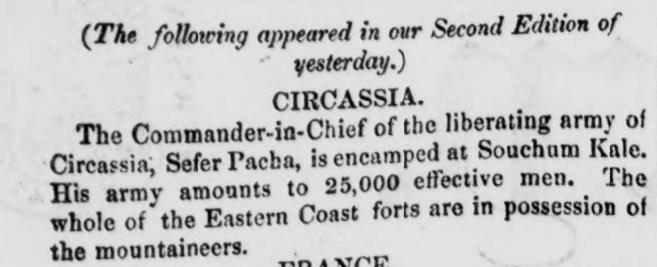
Essex Standard - 30 January 1857
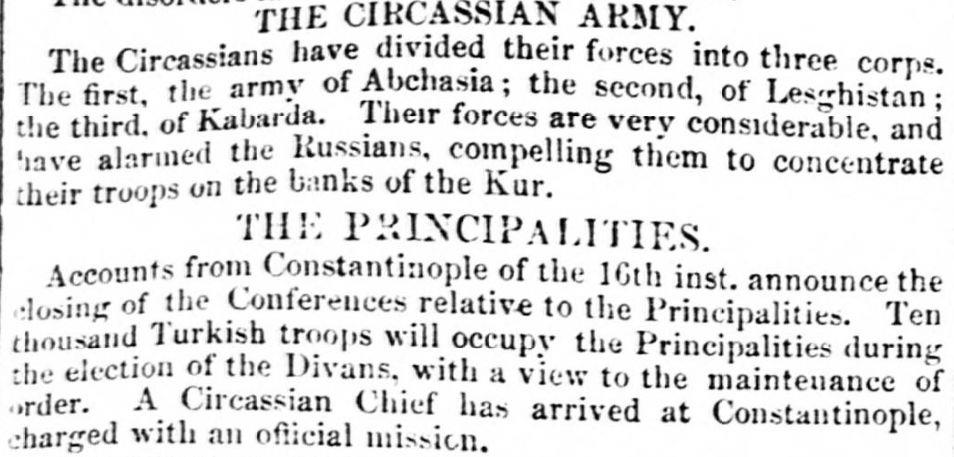
At that time, the term “Circassian” was clearly being used as a cover-term for all the North Caucasian peoples, including the Abkhazians, much as “Cherkess” has come to be similarly used in Turkey today. See the Sunderland Daily Echo and Shipping Gazette -Tuesday 19 February 1878”
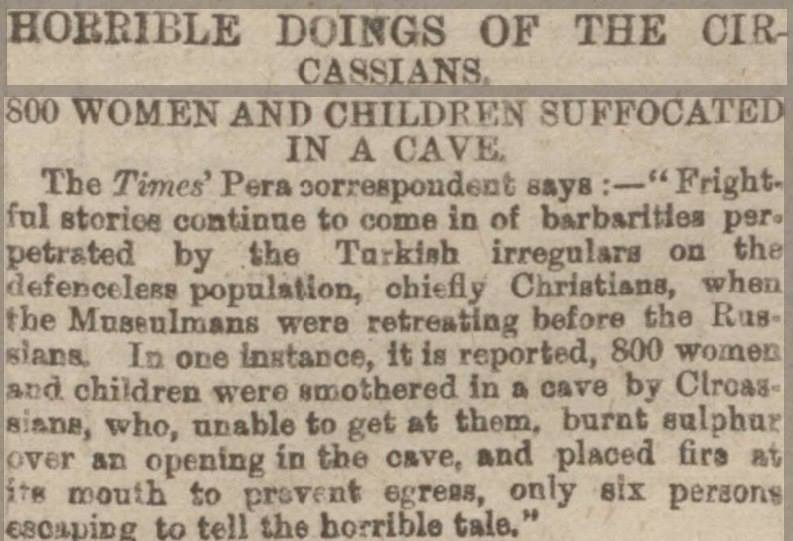
London Daily News - 3 September 1866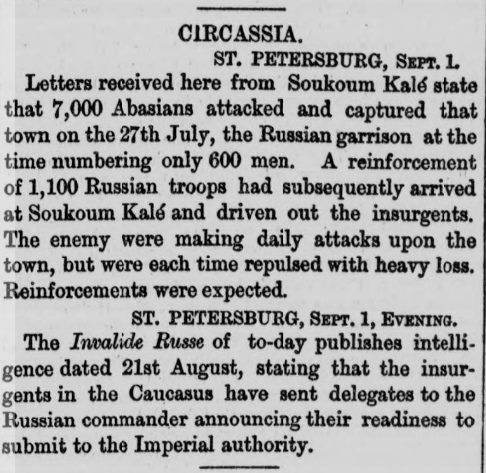
Bath Chronicle and Weekly Gazette - Thursday 31 May 1877